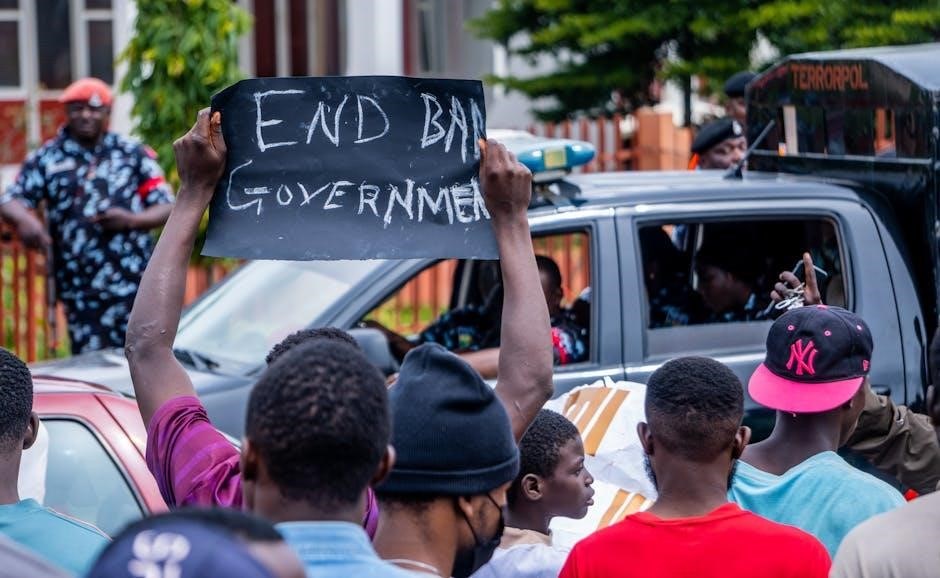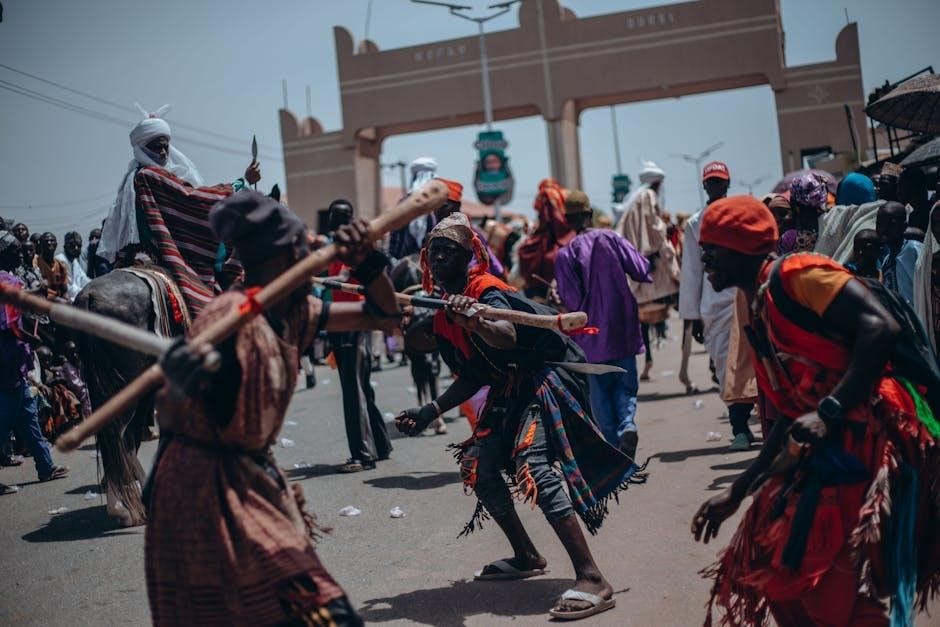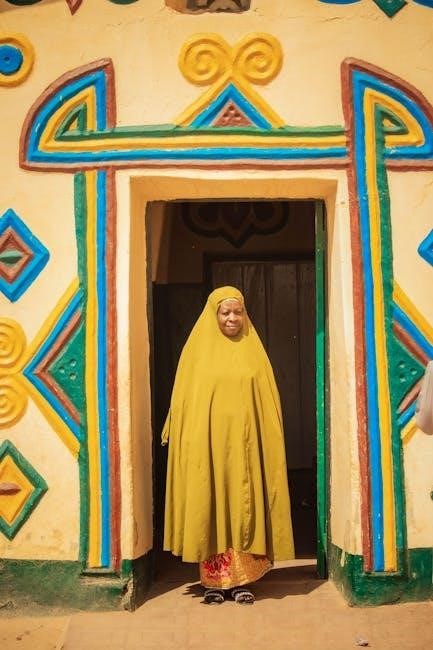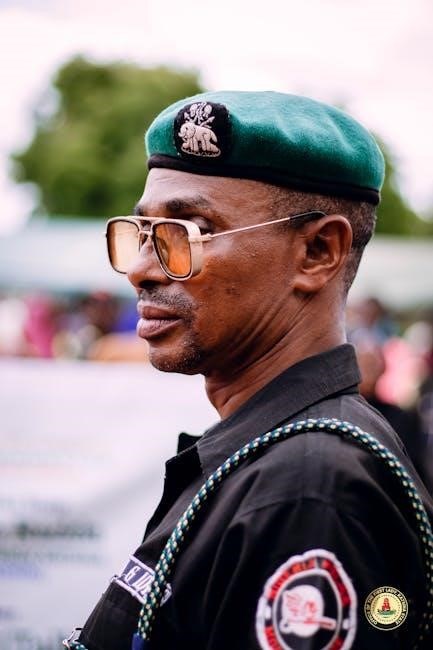military coups in nigeria pdf
Military coups have profoundly shaped Nigeria’s political trajectory, with the 1966 coup marking the onset of recurrent military interventions, leading to prolonged governance challenges and societal upheaval.
1.1 Historical Context of Military Interventions
Nigeria’s history of military coups began shortly after independence in 1960, with the first coup occurring on January 15, 1966. This intervention, led by Major Chukwuma Nzeogwu, marked the onset of recurrent military takeovers. The political instability and ethnic tensions of the post-independence era created fertile ground for military interventions; The 1966 coup and its aftermath, including a counter-coup later that year, set a precedent for decades of military rule, deeply influencing Nigeria’s political and social landscape.
1.2 Significance of Studying Military Coups
Studying military coups in Nigeria provides critical insights into the nation’s governance challenges, political instability, and societal dynamics. Understanding the causes, motivations, and outcomes of these interventions is essential for grasping the complexities of Nigeria’s post-independence trajectory. Analyzing these events helps identify patterns of political behavior, the role of ethnicity, and the impact of corruption. Such studies also offer lessons for preventing future instability and fostering sustainable democratic governance, making them vital for policymakers and scholars alike.

The First Military Coup of January 15, 1966
Nigeria’s first military coup occurred on January 15, 1966, led by Major Chukwuma Nzeogwu and other officers, marking the end of civilian rule and igniting political instability.
2.1 Key Players and Motivations
The 1966 coup was led by Major Chukwuma Nzeogwu and other predominantly Igbo officers, driven by frustration over corruption, political instability, and ethnic marginalization under the First Republic. Motivated by a desire to address regional imbalances and restore governance, they targeted key political and military leaders. However, the coup was perceived as Igbo-dominated, heightening ethnic tensions and leading to a counter-coup later in the year, which deepened Nigeria’s political and social divisions.
2.2 Immediate Aftermath and Political Repercussions
The 1966 coup led to the overthrow of the civilian government, with General Johnson Aguiyi-Ironsi seizing power. However, his leadership was short-lived, as a counter-coup in July 1966 resulted in his assassination. This event deepened ethnic tensions, particularly between the Igbo and other groups, leading to widespread unrest. The political repercussions included a prolonged period of military rule, regional mistrust, and ultimately, the escalation into the Nigerian Civil War (1967–1970), which further fractured the nation and undermined its political stability.
Causes of Military Coups in Nigeria
Military coups in Nigeria stem from political instability, ethnic tensions, economic corruption, and weak civilian governance, often exacerbated by competing interests and power struggles among elites.
3.1 Political Instability and Ethnic Tensions
Political instability and ethnic tensions have long been root causes of military coups in Nigeria. The nation’s diverse ethnic groups often clashed over resource distribution and political power, leading to governance breakdown. Regional divisions and religious conflicts further exacerbated these tensions, creating an environment where military interventions seemed a viable solution to restore order. The 1966 coup, for instance, was driven by ethnic and political rivalries, highlighting how these factors destabilized the nation and paved the way for recurrent military takeovers.

3.2 Economic Factors and Corruption
Economic instability and rampant corruption have historically contributed to military coups in Nigeria. Poor governance, mismanagement of resources, and widespread corruption eroded public trust in civilian governments. Economic inequality and unemployment further fueled discontent, creating an environment where military interventions were justified as necessary to restore stability. The 1983 coup, for instance, was partly driven by economic decline and perceived corruption under the civilian regime, showcasing how financial mismanagement and graft destabilized the nation.

3.3 Weak Civilian Governance and Institutional Failures
Weak civilian governance and institutional failures significantly contributed to military coups in Nigeria. Poor leadership, ineffective policies, and the failure of democratic institutions to address societal needs created widespread disillusionment. The inability of civilian governments to manage ethnic and regional diversity exacerbated political instability. These failures often provided the military with a justification to intervene, as seen in the 1966 coup, where the government’s inability to maintain order and integrity led to its collapse.

Notable Military Coups in Nigerian History
Nigeria’s history features several notable military coups, including the January 15, 1966 coup, the July 29, 1966 counter-coup, the 1983 coup led by General Muhammadu Buhari, and the 1985 coup by General Ibrahim Babangida.
4.1 The 1966 Counter-Coup and Its Consequences
The 1966 counter-coup, occurring on July 29, was a direct response to the January coup, fueled by ethnic tensions and perceptions of Igbo dominance. General Aguiyi-Ironsi, the initial coup leader, was assassinated, and Colonel Yakubu Gowon emerged as the new military leader. This counter-coup deepened regional divisions, exacerbated ethnic mistrust, and plunged Nigeria into a period of political instability. Its aftermath directly contributed to the outbreak of the Nigerian Civil War in 1967, as tensions between the North and the Eastern Region escalated irreparably.
4.2 The 1983 Coup and the Rise of General Muhammadu Buhari
The 1983 coup, occurring on December 31, was led by senior military officers who overthrew the democratically elected government of President Shehu Shagari. Citing widespread corruption and political instability, General Muhammadu Buhari emerged as the new Head of State. His regime emphasized anti-corruption campaigns and discipline, gaining initial public support. However, his strict policies and human rights concerns led to his removal in the 1985 counter-coup by General Ibrahim Babangida, marking another shift in Nigeria’s turbulent political landscape.
4.3 The 1985 Counter-Coup by General Ibrahim Babangida
The 1985 counter-coup, led by General Ibrahim Babangida, overthrew General Muhammadu Buhari’s regime. Citing issues like authoritarian governance and economic mismanagement, Babangida promised reforms and inclusivity. His administration introduced policies aimed at stabilizing the economy and improving governance. However, his tenure was marked by political manipulations and the annulment of the 1993 elections, leading to widespread unrest. Babangida’s rule ended in 1993, leaving a complex legacy in Nigeria’s political history.

Impact of Military Coups on Nigerian Society
Military coups have caused political instability, economic decline, and social unrest, eroding trust in institutions and deepening ethnic divisions, undermining Nigeria’s long-term development and societal cohesion.
5.1 Political Instability and Democratic Setbacks
Military coups have repeatedly disrupted Nigeria’s political stability, leading to the collapse of civilian governments and the entrenchment of authoritarian rule. These interventions exacerbated power struggles, weakened democratic institutions, and undermined trust in governance. The frequent overthrow of elected governments created a cycle of instability, hindering the consolidation of democracy and fostering an environment of political uncertainty. This legacy continues to challenge Nigeria’s efforts to build a stable democratic framework and ensure accountability in governance.
5.2 Economic Decline and Infrastructure Neglect
Military coups in Nigeria have exacerbated economic decline by disrupting governance and discouraging foreign investment. The frequent regime changes led to mismanagement of resources, fostering corruption and neglect of critical infrastructure. This instability hindered long-term economic planning, resulting in stagnant development and widespread poverty. The diversion of public funds for political agendas further exacerbated the decay of essential services, leaving Nigeria’s economy and infrastructure in a precarious state for decades following military rule.
5.3 Social Unrest and Ethnic Divisions
Military coups in Nigeria deepened social unrest and ethnic divisions, often targeting specific groups and exacerbating regional tensions. The marginalization of certain ethnicities fueled resentment, leading to violent conflicts and communal clashes. Political instability post-coups further fragmented society, as ethnic loyalties became tools for power struggles. This polarization weakened national unity, fostering mistrust and hostility among diverse groups, which persists as a legacy of military interventions in Nigeria’s turbulent history.

The Role of the Military in Nigerian Politics
The Nigerian military has historically played a pivotal role in shaping governance, often justifying interventions as corrective measures for political instability and corruption, significantly influencing the nation’s trajectory.
6.1 Historical Justifications for Military Intervention
Military interventions in Nigeria were often justified as necessary corrections to widespread political instability, corruption, and ethnic tensions. The 1966 coup, led by young officers, aimed to address perceived ineptitude and regional favoritism in the civilian government. Historical accounts suggest that the military framed their actions as salvaging the nation from chaos, asserting their role as custodians of national stability. This narrative persisted, with subsequent coups rationalized as interventions to restore order and accountability in governance, reflecting broader post-independence challenges and the military’s self-perceived duty to intervene.
6.2 The Legacy of Military Rule in Nigeria
Nigeria’s military rule left a complex legacy, marked by both authoritarian governance and attempts at national development. While military regimes often suppressed political freedoms and civil liberties, they also initiated infrastructure projects and sought to centralize authority. However, the prolonged periods of military governance undermined democratic institutions and perpetuated corruption. The transition to democracy in 1999 marked a significant shift, but the societal and political impacts of military rule remain evident, shaping Nigeria’s ongoing struggles with governance and stability.
Recent Discussions on Military Intervention
Recent discussions on military intervention in Nigeria highlight growing concerns over political instability, with neighboring coups and domestic challenges fueling debates about the military’s potential role.
7.1 Calls for Military Takeover in Contemporary Nigeria
Recent calls for military intervention in Nigeria stem from widespread dissatisfaction with political instability, economic stagnation, and perceived government ineffectiveness. Videos and online discussions speculate about potential coup timelines, with some predicting a 2025 takeover. Despite reassurances from religious leaders and officials, the resurgence of such rhetoric underscores deep-rooted frustrations. However, critics argue that military rule offers no solution to Nigeria’s complex challenges, emphasizing the need for democratic reforms instead.
7.2 The Role of Neighboring Countries’ Coups in Shaping Perceptions
Recent military coups in neighboring Niger and Gabon have intensified debates in Nigeria about the potential for military intervention. These events have influenced public perceptions, with some viewing coups as a possible solution to Nigeria’s challenges. The frequency of coups in the region has heightened fears and discussions, prompting reflections on the military’s role in Nigerian politics and the stability of democratic governance in West Africa.
Nigeria’s Transition to Democracy
Nigeria’s shift from military rule to democracy marked a pivotal era, restoring civilian governance and fostering political stability, despite ongoing challenges in sustaining democratic practices effectively.
8.1 The End of Military Rule and the Return to Civilian Governance
Nigeria’s transition from military rule to civilian governance marked a significant shift in its political landscape. After years of authoritarian control, the country embraced democracy, with power handed back to elected officials. This transition, though fraught with challenges, symbolized a collective desire for accountability and representation. The 2015 elections, which saw a peaceful transfer of power, underscored the nation’s commitment to democratic principles.
Despite historical military interventions, Nigeria’s recent democratic milestone of 25 years highlights progress. However, the legacy of military rule continues to influence political dynamics, emphasizing the need for robust institutional frameworks to sustain civilian governance and prevent future relapses into authoritarianism.
8.2 Challenges of Sustaining Democracy in Post-Military Nigeria
Nigeria faces significant challenges in maintaining democratic governance, including political instability, corruption, and ethnic tensions; Recent coups in neighboring countries like Niger and Gabon have heightened fears of military intervention, sparking debates about the resilience of Nigeria’s democracy. Despite progress, weak institutions and governance failures persist, threatening long-term stability.
The 2015 elections marked a turning point, but sustaining democracy requires addressing systemic issues. Calls for military intervention and political instability highlight the fragile nature of Nigeria’s post-military democracy, emphasizing the need for strong leadership and reforms to ensure lasting civilian rule.
Nigeria’s history of military coups highlights the need for strong governance. Recent discussions emphasize the importance of sustained reforms for stability.
9.1 Summary of Key Points
Nigeria’s history of military coups began in 1966, marking the start of recurrent interventions. Key coups include the 1966 counter-coup, 1983, and 1985. These events stemmed from political instability, ethnic tensions, and economic mismanagement. The transition to democracy in 1999 signaled a shift, but challenges persist. Recent discussions highlight neighboring coups’ influence and debates on military intervention. The legacy of military rule underscores the need for robust governance and institutional reforms to ensure democratic stability.
9.2 Reflections on the Future of Civil-Military Relations in Nigeria
Strengthening civil-military relations is crucial for Nigeria’s democratic stability. The military must remain apolitical, prioritizing national security over political ambitions. Institutional reforms, accountability, and professionalism within the armed forces are essential to prevent future coups. Civil society and political leaders must foster trust and collaboration to address governance challenges. A robust democratic framework and economic development can mitigate risks of military intervention, ensuring long-term stability and civilian supremacy in Nigeria’s evolving political landscape.


